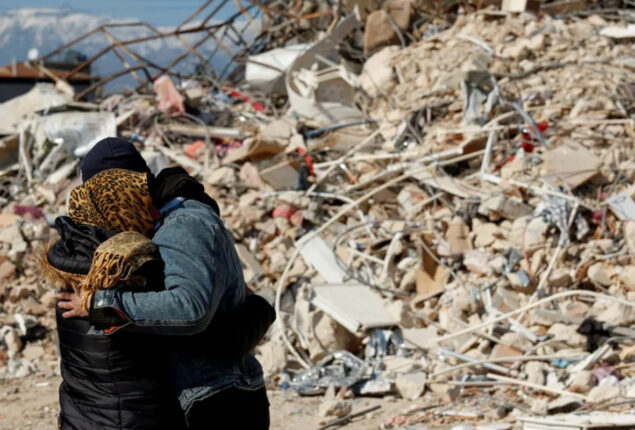Kylian Mbappe pledged to do his best to help earthquake victims in Turkey
Kylian Mbappe is the French football star for PSG. He pledged to...

Women bear additional burdens as a result of Turkey’s earthquake
The shelves of the makeshift clinic, which is little more than an orange storage container, contain everything women are too afraid to ask for on the streets of Turkey’s earthquake zone.

Doctor Meltem Gunbegi reconnects women with the basics they feel uncomfortable discussing in the crowds of mass aid distribution centres, from underwear to period and contraception products.
She also lends a sympathetic ear, assisting the women of Antakya, Turkey‘s devastated southern city, in processing the grief and death they have experienced in the last month.
The death toll from the 7.8-magnitude earthquake has risen to over 46,000 in Turkey and nearly 6,000 in Syria, making it one of the world’s ten deadliest in the last century.
According to a top United Nations official, the damage alone totaled more than $100 billion, with additional funds required for recovery costs.
“Many are shy when it comes to asking for basics, such as bras, wax bands and tweezers, so they come and visit our container,” said the 33-year-old doctor.
According to Gunbegi, more women are experiencing genital problems as a result of poor hygiene conditions in tent cities across the 11 quake-affected provinces.
But she also sees women who are clearly in shock and are too traumatised to think about their own bodies, even when they are pregnant.
“They experienced a lot of death and destruction,” said the doctor. “They really don’t seem to think about the baby. They are in a state of trauma.”
Semire Duman, a 51-year-old earthquake survivor who has been living in a tent for a month, said women have many needs.
“We have no shower, no toilet, no water, nothing,” she told AFP, and then almost whispered: “We don’t have underwear.”
Gazele Sumer, 57, expressed dissatisfaction with the lack of privacy in tents
“We are six people in one tent,” she said. “We sit here, we eat there, we sleep here,” she added.
Selver Buyukkeles, an earthquake survivor who works with the Mor (Purple) Solidarity, said that even before the February 6 quake, women bore the brunt of daily burdens such as chores and family care.
They are now attempting to do the same while dealing with personal pain and the acute sense of insecurity that comes with street life.
“Women queue to get food at distribution centres. They cook, and they take care of the children and the elderly. They do the dishes. They do the laundry,” the 28-year-old said.
“Women feel responsible for their family’s situation. They fear a new earthquake and the communal life in tents makes them insecure,” she said.
Despite Turkey’s poor record on the issue, activists and doctors interviewed have not seen any more cases of domestic violence or abuse at this point.
Fidan Ataselim, secretary general of the We Will Stop Femicide Platform, has called for the establishment of “safe shelters” and “prevention centres” for women in affected areas.
We Will Stop Femicide raises awareness about the murder and abuse of women in the predominantly Muslim but officially secular state.
According to data compiled by the platform, at least 327 women were killed and 793 were injured in 2022.
Back at Antakya’s Dostluk (Friendship) park, not far from Gunbegi’s makeshift clinic, volunteers work in shifts to ensure the safety of the 200 women who have taken refuge in dozens of tents.
Others are stationed outside toilets and shower cabins.
“Safe zone for women and LGBT+ here,” proclaims posters in Turkish and Arabic.
The Arabic is a nod to the millions of refugees and migrants who have been living in southern Turkey since the civil war in neighbouring Syria began 12 years ago.
“We have a security system for both women and LGBT+, who are more vulnerable in such disasters,” said Aslihan Keles, 23, one of the volunteers in the park.
On March 8, the official International Women’s Day, Turkish women frequently join marches demanding better lives and protection from domestic violence.
However, things are different in the earthquake zone this year, according to Keles.
“Here, there is an emergency,” she said. “This time, we are in the field — but for a very good cause.”
Catch all the World News, Breaking News Event and Latest News Updates on The BOL News
Download The BOL News App to get the Daily News Update & Follow us on Google News.